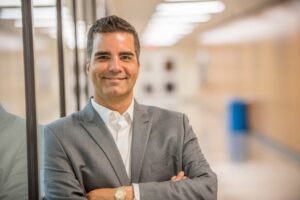HSC names Dr. Christopher Ray as new Deputy Provost
- October 30, 2023
- By: Steven Bartolotta
- Our People
 The University of North Texas Health Science Center at Fort Worth has named Dr. Christopher Ray as the new deputy provost. Ray, who presided over the launch of several innovative and nationally ranked academic programs as the dean of the College of Health Sciences at Texas Woman’s University, will begin his new role on November 7.
The University of North Texas Health Science Center at Fort Worth has named Dr. Christopher Ray as the new deputy provost. Ray, who presided over the launch of several innovative and nationally ranked academic programs as the dean of the College of Health Sciences at Texas Woman’s University, will begin his new role on November 7.
As deputy provost, Ray will be a senior academic administrator with universitywide responsibilities related to assisting HSC’s provost and executive vice president, Dr. Charles Taylor. Ray will assist in the supervision and management of all academic colleges, schools, departments and programs to deliver high-quality education, research and service.
“We are all very excited about the addition of Dr. Christopher Ray to the Health Science Center,” Taylor said. “He is a highly respected innovator and institutional leader. Dr. Ray has more than 20 years of expertise and leadership in academic affairs and research development. He will be an incredible asset to our institution.”
At HSC, Ray will be the lead executive of the provost’s leadership team. He will oversee all matters related to university curricula and instruction, student services, academic resources and faculty affairs.
Since 2016, Ray had served as dean of the College of Health Sciences at Texas Woman’s University, where he oversaw five departments, two schools and five on-site clinics across three campuses.
Under Ray’s leadership, TWU’s School of Occupational Therapy was the top-ranked program in Texas and No. 17 in the nation in 2020, according to U.S. News and World Report. Ray helped secure a $2 million donation for that program’s naming rights and funded an endowed director for the school.
“I am truly honored and humbled to be joining this world-class institution and a leadership team of this caliber” Ray said. “I have always held HSC in the highest regard, and I am so excited that I will have the privilege of working and collaborating with the best faculty and staff in the profession to fulfill our mission.”
At TWU, Ray spearheaded the expansion of research, enhanced clinical learning opportunities for students, and capitalized on the many synergies across all programs. His leadership resulted in the launch of innovative academic programs in occupational therapy, nutrition and public health. He also led the efforts to secure $100 million of legislative funding for a new health sciences building on the Denton campus that opens in the fall of 2025. A champion of values-focused leadership, he has more than 20 years of leadership experience in research development and academic affairs.
As a leading expert on geriatric health, Ray has secured more than $1.9 million in funding to develop innovative rehabilitation programs aimed at reducing falls in older adults, increasing bone density and lessening the impact of chronic disease.
Prior to TWU, Ray served from 2014 to 2016 as the associate dean for research in the College of Nursing and Health Innovation at the University of Texas at Arlington, where he also directed UTA’s Postural Control Laboratory and Center for Health Living and Longevity. He also increased research funding from $3 million to $18 million in only 18 months while also overseeing the curricular approval of numerous programs through the Texas Higher Education Coordinating Board.
In 2018, Ray was a member of the Texas Governor’s Executive Development Program. He was twice nominated for the Regents’ Outstanding Teaching Award in 2011 and 2014, and he was also a nominee in 2011 for the UTA President’s Award for Excellence in Distance Education Teaching. He is active in many professional associations, including serving as a review panelist for the National Institutes of Health.
Ray holds a doctoral degree in movement studies from the University of Georgia and earned both a master’s — in human performance and sport studies — and a bachelor’s degree in exercise science from the University of Tennessee, Knoxville.
He conducted his post-doctoral fellowship work at the Veterans Administration Medical Center in Atlanta.






Social media